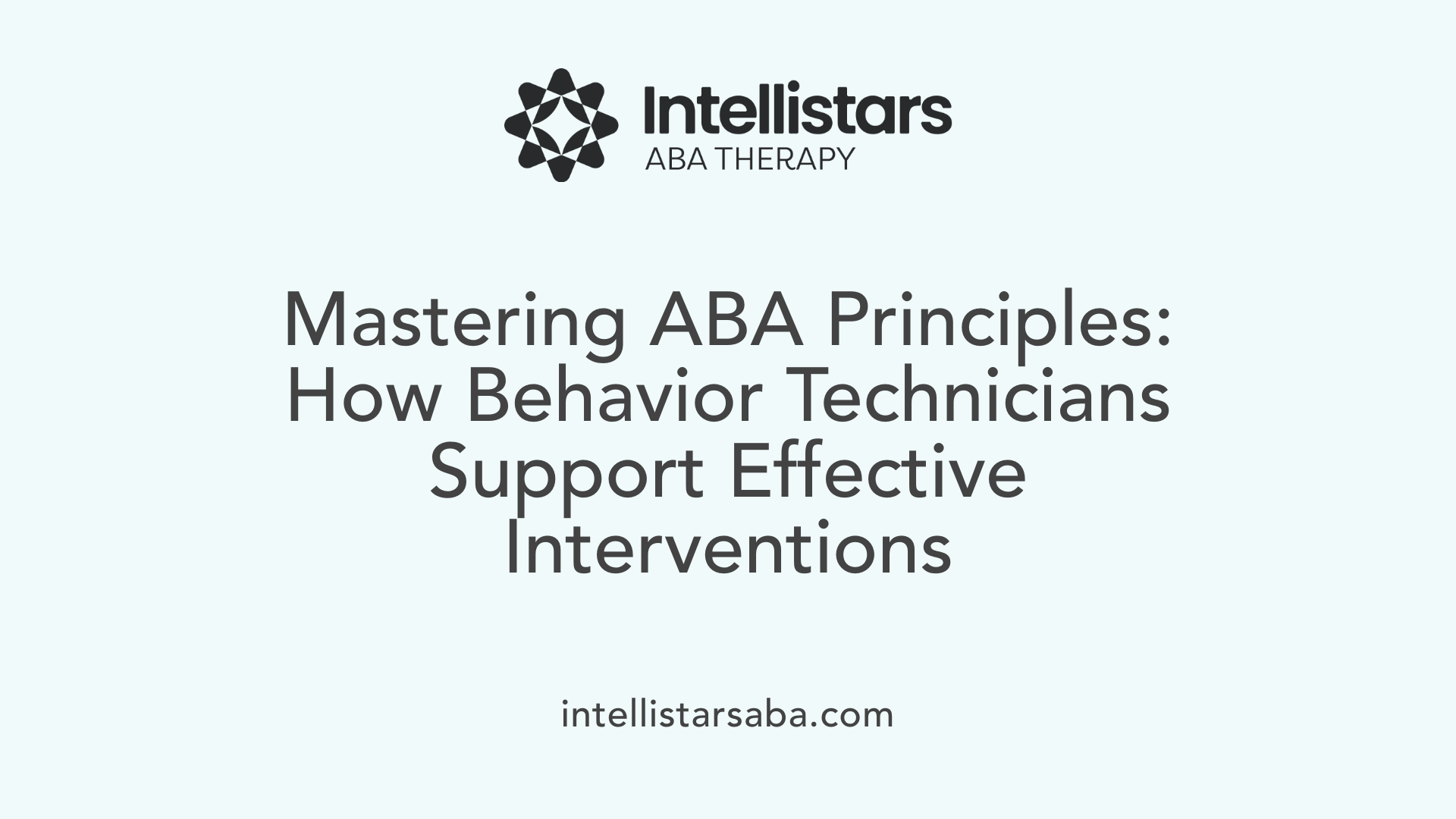Understanding the Pillars of Effective Autism Treatment
Behavior technicians are integral to the success of ABA therapy teams, providing direct support and implementing scientifically validated strategies that foster meaningful progress in individuals with autism. This article explores their roles, responsibilities, qualifications, collaboration efforts, and the profound impact they have on treatment outcomes.
The Core Responsibilities of Behavior Technicians in ABA Therapy

What is the role of behavior technicians in ABA therapy teams?
Behavior technicians, particularly Registered Behavior Technicians (RBTs), are vital members of ABA therapy teams. They work directly with individuals undergoing treatment, primarily children with autism spectrum disorder (ASD) and other developmental conditions. Under the supervision of Board-Certified Behavior Analysts (BCBAs), RBTs implement tailored intervention plans designed to improve communication, social skills, and adaptive behaviors.
Their role is hands-on and practical. RBTs execute specific activities outlined in the treatment plan, using evidence-based techniques like positive reinforcement to encourage desired behaviors. They are responsible for collecting detailed data during each session, tracking how often behaviors occur, their intensity, and their duration. This information helps BCBAs assess progress and decide whether adjustments to the intervention are necessary.
RBTs work in various settings—homes, schools, clinics, and community centers—providing consistent support and skill development across different environments. Building trust and rapport with clients is fundamental, as it creates a supportive environment conducive to learning and behavior change.
Importantly, RBTs must uphold professional and ethical standards, participate in ongoing training, and receive regular supervision from BCBAs to ensure they provide high-quality, effective care. Their diligent efforts significantly contribute to the overall success of ABA programs, helping individuals reach their developmental goals.
Foundations and Techniques of ABA Therapy Supported by Behavior Technicians

What principles and techniques are involved in ABA therapy, and how do behavior technicians support these methods?
Applied Behavior Analysis (ABA) is a scientifically supported approach that focuses on understanding and changing behavior through environmental influences. Central to ABA are technical strategies such as reinforcement, prompting, shaping, modeling, and chaining. These methods work together to help individuals develop new skills and reduce problematic behaviors.
Reinforcement involves providing a rewarding consequence after a desired behavior, encouraging its recurrence. Prompting uses cues or assistance to help clients perform behaviors successfully, gradually fading as independence increases. Shaping involves reinforcing successive approximations toward a target behavior, shaping complex skills step-by-step. Modeling demonstrates desired behaviors for clients to imitate, while chaining links smaller learned behaviors into more complex sequences.
To tailor interventions, BCBAs conduct comprehensive assessments to identify individual strengths, needs, and specific behaviors. This information guides the development of personalized treatment plans that include clear, measurable goals.
Behavior technicians, particularly Registered Behavior Technicians (RBTs), play a crucial role in applying these principles. They implement therapy strategies daily, following the plans created by BCBAs. Their responsibilities include executing interventions accurately, monitoring client responses, and collecting data on behavior frequency, intensity, and duration.
Data collection is essential for tracking progress and determining the effectiveness of interventions. Behavior technicians also adapt their approaches in real-time based on client reactions, ensuring that therapy remains responsive and effective.
Supporting skill development is a primary focus for RBTs. They work across various environments—homes, clinics, schools—to promote generalization and maintenance of skills learned during sessions. Additionally, RBTs collaborate with families and other professionals to ensure consistency in intervention implementation.
Overall, behavior technicians serve as the frontline practitioners of ABA. By faithfully executing evidence-based strategies, maintaining detailed records, and fostering positive relationships, they greatly contribute to meaningful behavioral improvements and enhanced daily functioning for individuals with autism and developmental disabilities.
Qualifications, Skills, and Certification Pathways for Behavior Technicians
What are the qualifications and skills required for behavior technicians?
To become a behavior technician, the minimum educational requirement is typically a high school diploma or GED. Prospective technicians must complete a 40-hour training program approved by the Behavior Analyst Certification Board (BACB). This training covers fundamental concepts of Applied Behavior Analysis (ABA), professional and ethical responsibilities, behavior reduction techniques, data collection methods, and client rights.
After completing the training, candidates must pass a competency assessment conducted by a qualified evaluator to demonstrate practical understanding of ABA procedures.
Certification as a Registered Behavior Technician (RBT) is achieved by passing the BACB’s 85-question exam, which assesses knowledge on ABA principles, ethics, and intervention strategies.
Skills necessary for success include patience, excellent communication, attentiveness, and strong observational skills. Empathy and the ability to work effectively with children and families are also vital. Behavior technicians should be organized, adaptable, and capable of problem-solving to handle diverse and dynamic therapy environments.
Additionally, ongoing professional development and supervision are essential for maintaining certification, ensuring that techniques remain current and ethical standards are upheld.
Collaboration and Teamwork: Behavior Technicians with Professionals and Families
 In ABA therapy, behavior technicians do not work in isolation. Instead, they are vital members of a larger, multidisciplinary team dedicated to improving outcomes for individuals with autism and developmental disorders. This team includes Board Certified Behavior Analysts (BCBAs), speech therapists, occupational therapists, medical professionals, teachers, and most importantly, the families of clients.
In ABA therapy, behavior technicians do not work in isolation. Instead, they are vital members of a larger, multidisciplinary team dedicated to improving outcomes for individuals with autism and developmental disorders. This team includes Board Certified Behavior Analysts (BCBAs), speech therapists, occupational therapists, medical professionals, teachers, and most importantly, the families of clients.
Behavior technicians collaborate closely with these professionals to provide the most effective and cohesive care. Communication channels are established through regular meetings, shared documentation systems like electronic health records, and real-time updates via technology tools. This ensures that everyone is on the same page, aware of progress, and able to respond swiftly to any changes needed in the intervention plan.
Respecting each professional’s expertise is fundamental to productive teamwork. Behavior technicians acknowledge the specialized skills of BCBAs, therapists, and medical providers, fostering mutual respect. Clear role differentiation helps prevent overlap and confusion, ensuring that each team member focuses on their responsibilities, which enhances the quality of care.
A key aspect of collaboration involves joint goal setting and intervention planning. BCBAs typically develop individualized treatment plans based on comprehensive assessments, while behavior technicians implement these plans with fidelity. They continuously monitor client progress, provide feedback, and participate in team discussions. This dynamic process allows strategies to be adapted in real-time, increasing the likelihood of positive outcomes.
Family involvement is also central to successful ABA programs. Behavior technicians engage with families through meetings, educational sessions, and regular updates. This fosters a trusting relationship and ensures that interventions translate seamlessly across home, school, and community environments. When families are active participants, therapy becomes more personalized, consistent, and ultimately more effective.
Overall, the collaborative efforts of behavior technicians with a multidisciplinary team and families create a supportive network that maximizes the benefits of ABA therapy. Through communication, respect, shared goals, and coordinated planning, they help clients achieve meaningful developmental progress.
The Essential Role of Behavior Technicians in Delivering ABA
What is the role of behavior technicians in ABA therapy teams?
Behavior technicians, especially Registered Behavior Technicians (RBTs), are vital members of ABA therapy teams. They work directly with clients with autism and developmental disorders, translating treatment plans into practical, everyday activities. Under the supervision of Board-Certified Behavior Analysts (BCBAs), RBTs implement specific interventions that promote positive behavioral and skill development.
Their responsibilities go beyond just following plans. RBTs collect detailed data during each session, observing and recording behaviors to assess progress and effectiveness. This data helps BCBAs make informed decisions about necessary adjustments, ensuring the therapy remains tailored to each individual's evolving needs.
RBTs are present in various settings, including homes, schools, and clinics. They build strong relationships with clients and collaborate with families and educators to create consistent, supportive environments. This teamwork is essential for reinforcing skills across different environments and ensuring meaningful progress.
Adherence to ethical standards and ongoing training is crucial for RBTs. They participate in continuous professional development and work under strict supervision, maintaining high-quality and ethical practice. This structure ensures that therapy supports individuals with autism effectively and compassionately, making RBTs indispensable in ABA therapy.
Impact of Behavior Technicians on Treatment Outcomes

How do behavior technicians contribute to meaningful progress in therapy?
Behavior technicians, especially Registered Behavior Technicians (RBTs), are the backbone of ABA therapy. They directly implement treatment plans created by BCBAs, using effective teaching techniques like positive reinforcement and prompting. This hands-on approach helps clients learn new skills such as communication, social interaction, and daily living tasks. Their consistent support and structured interventions are vital for reducing problematic behaviors and encouraging positive development.
How do behavior technicians monitor progress and make adjustments?
Data collection is a core responsibility for behavior technicians. They record behaviors, such as the frequency, duration, and intensity during each session. This information is analyzed to evaluate progress and identify areas needing change. Because of this detailed data, BCBAs can modify treatment strategies promptly. This systematic approach ensures that interventions remain aligned with each client’s evolving needs, optimizing outcomes.
How do they promote the generalization and longevity of skills?
Building skills that last beyond therapy sessions is a major goal. Behavior technicians work to ensure that learned behaviors are generalized across different environments and people. They do this by practicing skills in various settings, involving family members, and applying natural teaching opportunities. Consistent reinforcement at home, school, and community settings helps maintain gains over time.
What is the importance of collaboration with families?
Family involvement is essential in ABA therapy. Behavior technicians collaborate closely with families to understand the child’s needs and to reinforce strategies at home. They provide training and support to caregivers, helping them implement behavior plans and continue fostering progress outside sessions. This partnership enhances consistency and reinforces skills in everyday life.
How do behavior technicians contribute to clients' overall quality of life?
Ultimately, the goal of ABA therapy and the role of these technicians is to improve the client's overall quality of life. Through skill development, reduction of challenging behaviors, and increased independence, clients experience greater social inclusion and personal satisfaction. Behavior technicians’ dedicated support helps clients access new opportunities, build relationships, and participate more fully in their communities.
| Aspect | Role of Behavior Technicians | Impact on Client Outcomes |
|---|---|---|
| Skill Acquisition | Implement tailored behavioral strategies | Increased communication, social, and adaptive skills |
| Behavior Reduction | Manage challenging behaviors with structured techniques | Improved safety, reduced disruptive behaviors |
| Monitoring Progress | Collect and analyze detailed data | Informed adjustments enhance effectiveness |
| Generalization | Practice skills across settings | Lasting behavior change and independence |
| Family Collaboration | Train caregivers and support consistency | Sustained progress and family empowerment |
| Overall Benefit | Provide consistent, supportive interventions | Enhanced quality of life and greater participation |
Evolution and Future Outlook of the Role of Behavior Technicians

What is the contribution of behavior technicians to treatment outcomes for individuals with autism?
Behavior technicians, especially Registered Behavior Technicians (RBTs), are integral to the success of ABA therapy for individuals with autism. They implement personalized behavior intervention plans (BIPs) developed by board-certified behavior analysts (BCBAs). Through the systematic use of evidence-based strategies like positive reinforcement and natural environment teaching, they help clients acquire new skills and diminish challenging behaviors.
Their role involves not just executing therapy interventions but also meticulous data collection during sessions. This data informs ongoing assessment and necessary adjustments, ensuring each treatment remains effective and tailored to the individual’s progress.
Beyond direct intervention, behavior technicians foster collaboration with families and work across different environments such as homes, schools, and community centers. This supports the generalization of skills learned during therapy, ultimately improving communication, social skills, and independence.
The dedication, training, and support provided by behavior technicians significantly influence positive developmental outcomes. Their efforts not only enhance individual growth but also elevate the overall quality of life for clients, making them essential players in the field of autism intervention.
Increasing demand and career opportunities
The demand for trained behavior technicians is rising steadily across the United States. As awareness about ABA therapy's effectiveness grows and insurance coverage expands, more families seek these services. Consequently, the career opportunities for RBTs are expanding, offering pathways into advanced roles such as becoming a BCaBA or pursuing further coursework to attain BCBA certification.
This increased demand also translates into competitive salaries and job stability. Many organizations and clinics are actively recruiting qualified technicians to meet the growing needs of their clients.
Advancements in training and certification
Recent advancements have enhanced the training process for behavior technicians. Now, completing a 40-hour foundational training program, performing supervised fieldwork, and passing the BACB’s certification exam are standard requirements. Ongoing professional development is also emphasized, with many organizations offering continued education resources.
Innovations in online training modules, simulation software, and competency assessments have made certification more accessible and effective, broadening the skills and knowledge base of these professionals.
Potential expansion into new areas of support
Looking forward, the role of behavior technicians is expected to expand beyond traditional settings. There is potential for involvement in areas such as adult autism services, vocational training, and community integration programs. As the understanding of neurodiversity and individualized support deepens, behavior technicians may also be involved in areas like mental health, social skills development, and autonomous living skills.
Continued importance of supervision and ethics
Despite expanding roles, the importance of supervision remains paramount. RBTs work under the direct supervision of BCBAs or BCaBAs, ensuring ethical and effective practice. Continued oversight guarantees that interventions are delivered in a manner consistent with current standards and that client well-being is prioritized.
Ongoing supervision and adherence to ethical guidelines will sustain high-quality care as the field evolves, fostering trust among clients, families, and professionals.
| Aspect | Current Status | Future Trends | Details / Implications |
|---|---|---|---|
| Demand for technicians | Growing steadily | Increased demand across diverse support areas | Leads to more career opportunities and job security |
| Training advancements | Standard 40-hour course + ongoing education | Use of online and simulation tools | Enhances accessibility and effectiveness of training |
| Role expansion | Traditional clinics and home settings | Adult services, vocational, community programs | Diversifies job functions and broadens impact |
| Supervision importance | Essential for ethical practice | Continuous supervision with evolving standards | Maintains high-quality, ethical service delivery |
As the field of ABA therapy continues to evolve, behavior technicians will remain vital. They will benefit from enhanced training options, expanded roles, and sustained supervised practice, all of which aim to improve outcomes for individuals with autism and other developmental challenges.
Empowering Treatment Through Skilled Support
Behavior technicians are the cornerstone of effective ABA therapy teams. Their expertise in implementing tailored interventions, collecting and analyzing data, and working collaboratively with families and professionals underpins the success stories observed in autism treatment. As the demand for ABA services grows, their role is set to expand further, emphasizing ongoing training, ethical practice, and innovative support strategies. Recognizing and investing in the skills of behavior technicians is essential for maximizing treatment outcomes and improving the quality of life for individuals with autism.
References
- Understanding the Role of Behavior Technician in ABA Therapy
- The Role of a Registered Behavior Technician | Autism F.I.R.S.T.
- What is a Behavior Technician or RBT?
- All About RBTs: Roles and Responsibilities | Inclusive ABA
- Understanding the Role of a Registered Behavior Technician
- Defining a Registered Behavior Technician: 6 Essentials You Need ...
- Role of Behavior Technician in ABA | True Progress Therapy






